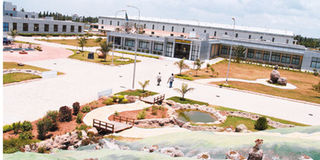EPZ exports expected to hit $300m this year

The Export Processing Zones Authority head office at Mabibo External in Dar es Salaam. PHOTO|FILE
What you need to know:
The Export Processing Zones Authority which is responsible for promoting investment in special zones says it plans to register 25 more companies this year
Dar es Salaam. Tanzania’s exports from companies licensed by the Export Processing Zones Authority (EPZA) are expected to grow by 36.36 per cent to $300 million as the regulator eyes to register 25 more companies this year.
EPZA director of investment, promotion and facilitation Ms Zawadia Nanyaro, said with the registration of new 25 firms, the move will bring the total number of investors to 155.
EPZA which operates under the Ministry of Industry and Trade is responsible for steering and implementing government policy on promotion of Special Economic Zones (SEZs) in Tanzania.
Tanzania has two investment promotion agencies; one is the Tanzania Investment Centre (TIC) and the other is the Export Processing Zones Authority (EPZA).
TIC coordinates investment in its totality and facilitates investments in different sectors and at different locations; whereas, EPZA registers investors who intend to invest in special zones only i.e Export Processing zones (EPZ) and Special Economic Zones (SEZs).
“With the increase in number of companies, it is our hope that export earnings will jump from$220 million last year to $300 million this year,” Ms Nanyaro said in an interview during the 37th Dar es Salaam International Trade Fair.
The value of Tanzania’s export of goods and services amounted to $9.41 billion in the year ending April 2015 compared with $8.56 billion in the corresponding period in 2014.
Imports stood at $13.38 billion during the same period, according to data from the Bank of Tanzania.
The revenue which the authority earned last year was the tangible fruits of total capital investment of $1.3 billion, an increase from $1.1 billion in 2013, she said.
The capital was invested in four areas. Agro-processing accounted for 39 per cent of investment; textiles 21 per cent and engineering and mineral processing contributed 31 per cent and 9 per cent respectively, according to Ms Nanyaro.
Already EPZA had set aside a total of 22,000 hectares of land in Bagamoyo for investment through the special processing zone and the area is expected to become an industrial and trade centre.
The authority has declared an area of 110 hectares to be a Free Port Zone at Mtwara port and earmarked 2,600 hactares for development of a modern SEZ.
In Kigoma, EPZA has also earmarked 700 hectares for development of a trade hub and industrial zone that will capture the cross border trade between Tanzania and the neighbouring countries of Burundi, DRC and Zambia.
To ensure that more investors are attracted, incentives are given to companies operating under EPZA. Such incentives include exemption of value added tax (Vat) and withholding tax for ten years.
“I call on local and foreign investors to invest in the country so as to improve the economy,” she said. By so doing, more jobs will be created.
For a company to be under the authority’s roof it must have a start-up capital of not less than $100,000 (Sh200 million) for Tanzanians and $300,000 (Sh600 million) for foreigners, according to Ms Nanyaro.
For their part, companies operating under EPZA commended the way they were treated by the authority, saying it was creating a friendly environment for their business to grow.
“The relief we get when importing raw materials has to a large extent lowered the costs of production,” the Morogoro-based Mazava fabrics and production company limited consultant Mr William Deus, told BusinessWeek.
He said they were happy as they stood a chance to import raw materials free of charge and adding an ice on the cake. He said they were also exempted from paying Vat.
Tanzania is the leading destination for Foreign Direct Investments (FDIs) in East Africa and it appears the EA’s second biggest economy is set for even better times following natural gas discoveries which account for the largest chunk of the FDI, according to the 2015 World Investment Report, which was launched in Dar es Salaam recently.




